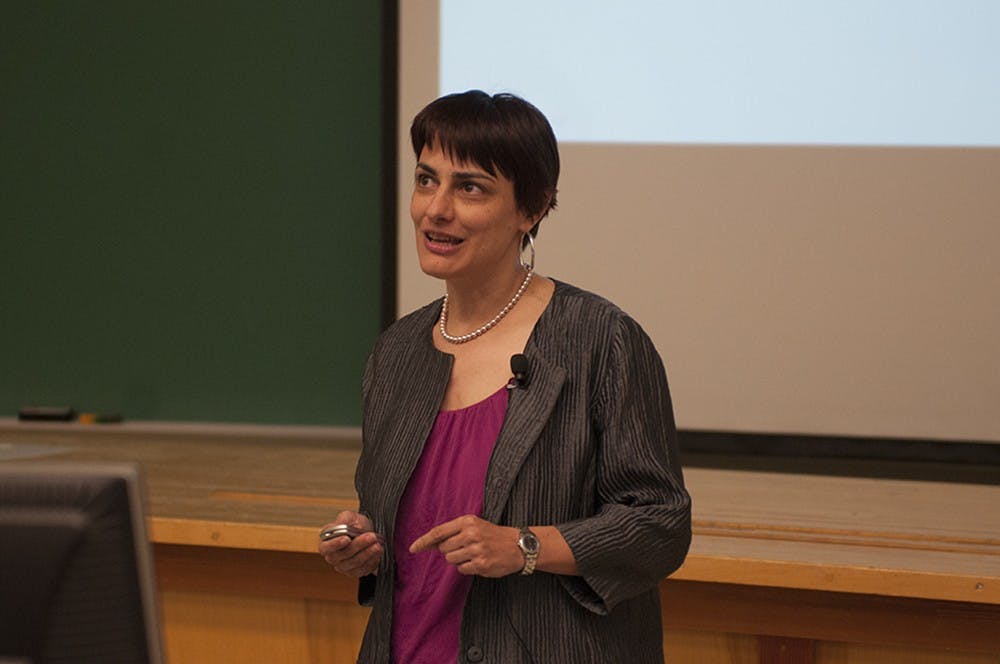Donna Riley, an engineering professor at Virginia Tech, visited the University Monday to discuss gender-based violence in science, technology, engineering and math fields. Riley discussed and analyzed the engineering, academic and broader U.S. cultures which work together to deny gender-based violence.
Riley said gender-based violence not only includes rape, but also stalking, intimate partner violence, harassment, non-consensual sexual contact, verbal abuse and misogynist hate crimes.
In the Survey of Academic Field Experiences published by science journal PLOS One in 2014, Riley said two-thirds of women surveyed reported being the victim of sexual harassment while researching in a scientific field, and 26 percent reported being sexually assaulted, usually by senior members of the research team.
Riley said men in the field experienced harassment and sexual assault as well, but chose to focus her talk on women.
Data from the survey found most victims of sexual harassment or assault were not aware they could report the offenses, and those who were aware and did report were largely unsatisfied with their institution’s response.
Riley focused mainly on why the engineering field as a discipline and as a culture has such a difficult time addressing problems of gender-based violence. Riley said the image of engineering men as nerdy or geeky plays an integral role.
Riley said sexual humor and violent metaphors are often present in engineering classrooms.
“[This is] the way engineers deal with normative masculinity [as a part of their culture],” Riley said. “There is this cultural norm [of masculinity] in engineering that’s not entirely separate from the US culture as a whole, but engineers have this way of taking it and intensifying it as a way to prove masculinity in a world where geeks are not seen as truly masculine in some ways.”
Riley said it is important to talk about systemic gender violence in engineering.
“There’s no room for talking about misogyny as a systemic construct in engineering world because we don’t even have the vocabulary,” Riley said. “[But] silence itself is a form of privilege because people don’t talk about it when they don’t have to talk about it.”
Pointing to privacy, liability and silence as institutions which prevent conversations about gender-based violence in engineering, Riley said two of the most pervasive constructs are the depoliticization of engineering and its merit-based system of power.
The smartest, toughest students who are able to pass every test no matter the cost are those who prevail, she said before noting how the idea of “sublimating bodily desire to the power of the test” is pervasive within STEM culture.
“As soon as you start to talk about power, you start talking about politics in some way,” Riley said. “Then you get to talking about how maybe the merit system is biased.”
Talk of politics and social justice in engineering, Riley said, is strictly avoided.
“A lot of engineering faculty would not consider this talk to be an engineering talk,” Riley said.
Riley tied the issue of engineering culture’s gender violence to the larger issue of sexual assault on college campuses.
“U.Va. became this kind of focal point for sexual violence [following the Rolling Stone article],” she said. “I think this is a really good place to… test out some ideas.”
Riley noted the conversation around the controversial Rolling Stone article has shifted focus from sexual assault to journalistic ethics.
“The national conversation has changed completely,” she said. “It’s as if this were the only rape that ever happened on a campus, but we know there are other rapes happening here and other rapes happening at other colleges… These failures of universities not responding to sexual assault on campus is not unique to U.Va.”
This change in conversation is what Riley said she finds problematic, because it is the issue she said she sees in STEM as well — no one is talking about gender-based violence.
She emphasized the importance of student dialogue on campuses and cited the WordPress “What We Want from U.Va. Faculty” as an example.
“When students can get together and have a voice, that can make a very real difference,” Riley said.
The most important thing in both engineering and academic culture, Riley said, is to begin discussing gender-based violence as a systemic, institutional problem.
“If we can’t guarantee basic physical safety for women in STEM, then what are we doing talking about [anything else encouraging women to join STEM]?” Riley said. “I think we haven’t tried very hard yet.”







